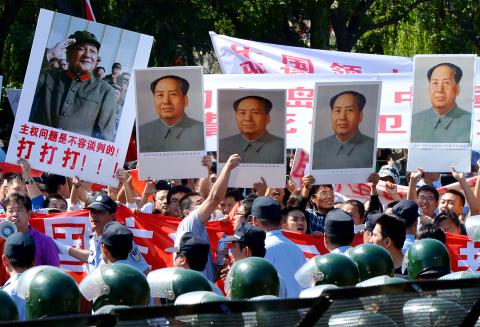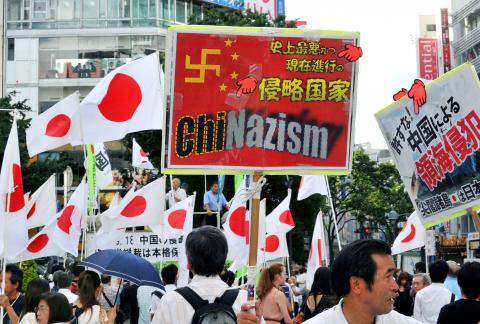Anti-Japan protests reignited yesterday across China, the sensitive anniversary marking Tokyo’s occupation of its giant neighbor, escalating a maritime dispute that has forced major Japanese brandname firms to suspend business there.
Relations between Asia’s two biggest economies have faltered badly, with emotions running high on the streets and also out at sea where two Japanese activists landed on an island at the center of the dispute.
China reacted swiftly to the news of the landing, which risked inflaming a crisis that already ranks as China’s worst outbreak of anti-Japan sentiment in decades. Beijing described the landing as provocative, lodged a complaint with Tokyo and said it reserved the right to “take further action.”

Photo: AFP
The dispute over the uninhabited group of islands in the East China Sea — known as the Senkakus in Japan and Diaoyu Archipelago (釣魚群島) in China — led to another day of protests that were smothered by a heavy blanket of security.
Japanese businesses shut hundreds of stores and factories across China and Japan’s embassy in Beijing again came under siege by protesters hurling water bottles, waving Chinese flags, and chanting anti-Japan slogans.
Japanese Prime Minister Yoshihiko Noda urged Beijing again to protect Japanese citizens in China.

Photo: AFP
“Today is our day of shame,” said a Beijing protester, Wei Libing, a waiter in his 40s. “Japan invaded China on this date.”
“Wipe out all Japanese dogs,” read one banner held aloft by one of thousands of protesters marching on the embassy, which was ringed by riot police standing six rows deep. Japan’s foreign ministry said some embassy windows had been smashed.
For China, yesterday marked the day Japan began its occupation of parts of China in 1931. Rowdy protests sprang up in several cities, including Shanghai, raising the risk they could get out of hand and backfire on Beijing. One Hong Kong paper said some protesters in Shenzhen had been detained for calling for democracy and human rights.
“We still hope for a peaceful and negotiated solution to this issue and we hope to work together and work well with the Japanese government,” Chinese Defense Minister Liang Guanglie (梁光烈) said after meeting US Secretary of Defense Leon Panetta.
Japan’s coast guard said three Chinese marine surveillance ships briefly entered what Japan considers its territorial waters near the disputed islets yesterday evening, the second time since Friday when six ships briefly entered the waters.
Yesterday’s brief landing by two Japanese nationals on one of the disputed islands has raised fears of a direct clash in an area being patrolled by ships from both nations.
“The unlawful landing of the Japanese right-wingers on the Chinese territory of the Diaoyu islands was a gravely provocative action violating Chinese territorial sovereignty,” Chinese Foreign Ministry spokesman Hong Lei (洪磊) said.
The activists briefly landed on one of the islands, having paddled up to it in a rubber raft and swum ashore before returning to the boat, Japanese broadcaster NHK said.

SECURITY: As China is ‘reshaping’ Hong Kong’s population, Taiwan must raise the eligibility threshold for applications from Hong Kongers, Chiu Chui-cheng said When Hong Kong and Macau citizens apply for residency in Taiwan, it would be under a new category that includes a “national security observation period,” Mainland Affairs Council (MAC) Minister Chiu Chui-cheng (邱垂正) said yesterday. President William Lai (賴清德) on March 13 announced 17 strategies to counter China’s aggression toward Taiwan, including incorporating national security considerations into the review process for residency applications from Hong Kong and Macau citizens. The situation in Hong Kong is constantly changing, Chiu said to media yesterday on the sidelines of the Taipei Technology Run hosted by the Taipei Neihu Technology Park Development Association. With

CARROT AND STICK: While unrelenting in its military threats, China attracted nearly 40,000 Taiwanese to over 400 business events last year Nearly 40,000 Taiwanese last year joined industry events in China, such as conferences and trade fairs, supported by the Chinese government, a study showed yesterday, as Beijing ramps up a charm offensive toward Taipei alongside military pressure. China has long taken a carrot-and-stick approach to Taiwan, threatening it with the prospect of military action while reaching out to those it believes are amenable to Beijing’s point of view. Taiwanese security officials are wary of what they see as Beijing’s influence campaigns to sway public opinion after Taipei and Beijing gradually resumed travel links halted by the COVID-19 pandemic, but the scale of

A US Marine Corps regiment equipped with Naval Strike Missiles (NSM) is set to participate in the upcoming Balikatan 25 exercise in the Luzon Strait, marking the system’s first-ever deployment in the Philippines. US and Philippine officials have separately confirmed that the Navy Marine Expeditionary Ship Interdiction System (NMESIS) — the mobile launch platform for the Naval Strike Missile — would take part in the joint exercise. The missiles are being deployed to “a strategic first island chain chokepoint” in the waters between Taiwan proper and the Philippines, US-based Naval News reported. “The Luzon Strait and Bashi Channel represent a critical access

Pope Francis is be laid to rest on Saturday after lying in state for three days in St Peter’s Basilica, where the faithful are expected to flock to pay their respects to history’s first Latin American pontiff. The cardinals met yesterday in the Vatican’s synod hall to chart the next steps before a conclave begins to choose Francis’ successor, as condolences poured in from around the world. According to current norms, the conclave must begin between May 5 and 10. The cardinals set the funeral for Saturday at 10am in St Peter’s Square, to be celebrated by the dean of the College